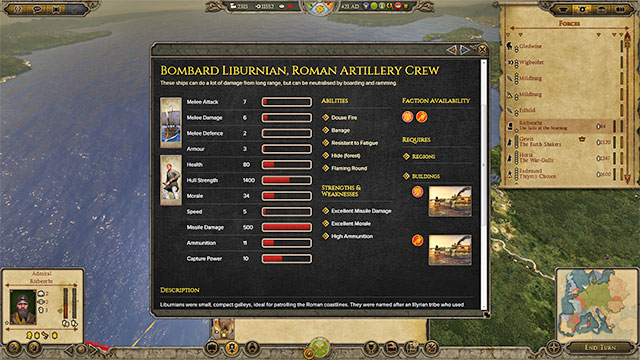Fleet | War

In many details fleets are similar to land armies. Units it consists of have statistics, levels and they gather experience. They are divided in categories with melee combat, range combat and artillery. They have their integrity and traditions, and their general can get ranks and new skills. After battle they need to replenish their ranks and in case of failure they ran away.
Differences are in scale. For land armies mountains and sees are boundaries, for fleets it is land. Land army can travel through sea to land on an island, while naval army can only backup it when being close to sea. Land army can attack any city in the game while fleet has access only to ports. Additionally, the amount of fleets possible to create will be always lower than amount of armies. All because of the fact that fleets have different set of objectives than land armies.
Most of all, armies work as backup for land armies fighting near a coast. It concerns both islands and coast settlements, such as Roma, Elusa or Lindum, that aren't ports, but they are close to sea. It means attacking land armies trying to travel through sea or raid your ports as well.
Second thing, fleets are supposed to cover allied armies traveling through sea. Land army that is on sea is treated like fleet, but receive sea sickness attribute. When attacked, it will fight, but its statistics will be lowered. Fleet fight well both on sea and during landing, so it is a perfect unit for more fragile colleagues from land. It is especially important since the amount of places where army might land is limited. High shores makes landing impossible, a beach is needed for that. So, as land army can pretend to be fleet, it will be worse than it in every aspect.
Three, a fleet should attack enemy ports. It especially apply to north and south Europe, where frequently it is easier to get to enemy settlements through sea than land. Additionally, through land you risk having to conduct a siege. But the best place for fleets to work is Mediterranean Sea, where virtually every city is near sea. When conquering those territories you can use land army, but fleet will be quicker and much more effective.
Four, fleet is used to block enemy ports, which interrupts sea trade, and to raid sea roads, that cannot be attacked in any other way. In case of countries that gather profits from sea trading, it allows you to interrupt their economy. Land army that travels through sea can do it as well, but it still receives penalties from sea sickness. To raid enemy trading roads, a fleet must be stationed on a sea that have a trading road and have stance: raiding activated.
Five, fleets are used to fight piracy with patrol stance.
Six, fleet can attack fortified city without the need of besieging it.
In other words, fleet becomes vital when it comes to fighting on sea or near it. You can use land army for that, but fleet will be in every aspect superior for that task. Additionally, armies and fleets have separate limits, which allows you to cheat the game a bit. Instead of sending two armies you can send one army and a fleet, and the second army delegate to other tasks.
One thing that you must remember, is that in difference to army, a fleet cannot land before a battle. Army can travel both through sea and land, and fleet can do it only through sea.
You are not permitted to copy any image, text or info from this page. This site is not associated with and/or endorsed by the SEGA or Creative Assembly. All logos and images are copyrighted by their respective owners.
Copyright © 2000 - 2025 Webedia Polska SA for gamepressure.com, unofficial game guides, walkthroughs, secrets, game tips, maps & strategies for top games.
